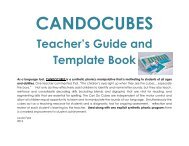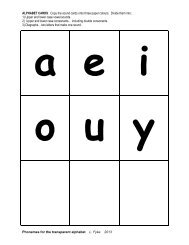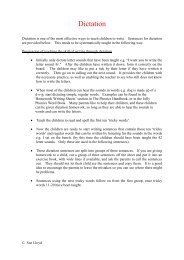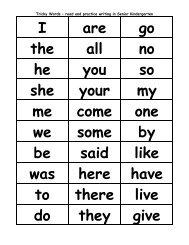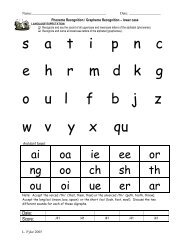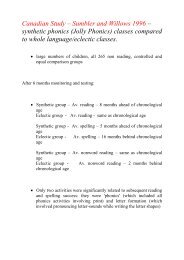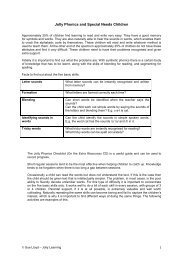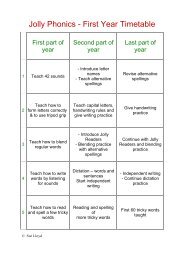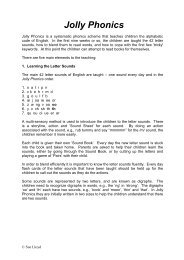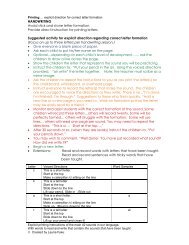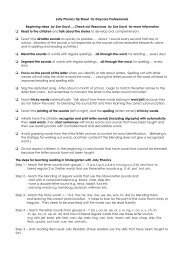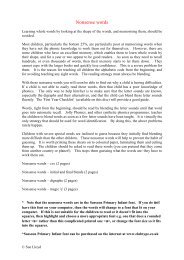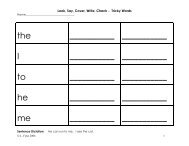Developmental Tasks.pdf - Primarily Learning
Developmental Tasks.pdf - Primarily Learning
Developmental Tasks.pdf - Primarily Learning
You also want an ePaper? Increase the reach of your titles
YUMPU automatically turns print PDFs into web optimized ePapers that Google loves.
Language<br />
Development<br />
Listening<br />
Development<br />
Visual<br />
Development<br />
Fine Motor/<br />
Eye Hand<br />
<strong>Developmental</strong> Reading <strong>Tasks</strong> Toddler to 3 +<br />
NOTE:<br />
Remember to provide numerous and varied learning opportunities through<br />
games, music and activities for young children. Some of the activities listed may<br />
be presented when the child is a toddler. Children develop at varying rates.<br />
Some children will quickly grasp and enjoy the activity while other will need<br />
repeated and varied learning opportunities.<br />
* All of the activities listed below are presented and many are assessed during<br />
senior kindergarten.<br />
Determine which of three things is not like the other. Tell why.<br />
(Visual discrimination.)<br />
* *<br />
Determine which two of three symbols are the same. Tell why. * *<br />
I spy something big, red and round. * * *<br />
Put 3-5 things on a tray. Ask the child to try to remember the items. Look<br />
at the tray. Cover it. List items that the child remembered. Check the list<br />
with the items on the tray. Increase to 7 items. (Visual memory)<br />
* *<br />
Without identifying sounds, match 2 of three symbols that are the same.<br />
(i.e. h h n; p d p; ai ae ae)<br />
Identify environmental sounds. (Auditory discrimination) * *<br />
Make the sounds of a specific animal. * *<br />
Match two sound shakers. *<br />
Delete part of a compound word. “Say doghouse. Now say it again but<br />
don‟t say dog.” (Auditory memory)<br />
* *<br />
Clap the syllables of a word. ( i.e. dog; ti-ger; hick-or-y; hel-i-cop-ter) * *<br />
Bounce a ball or tap stick to the syllable beats of a rhyme or song. * *<br />
Delete part of a two syllable word. “Say window. Now say it again but * *<br />
don‟t say -dow.”<br />
Delete part of a three syllable word. “Say wonderful. Now say it again<br />
but don‟t say won-.”<br />
* *<br />
Make up silly rhymes. (i.e. willy, nilly: rog, bog, mog) * *<br />
Fill in the missing word in a Nursery Rhyme. (i.e. “Jack and Jill went up * *<br />
the ______”)<br />
Copy clapping patterns. *<br />
Remember a 7 digit phone number. *<br />
Determine which of three words rhyme. * *<br />
Identify if two words rhyme. * *<br />
Make a rhyme. * *<br />
Develop fine motor control by using scissors, crayons, chalk, pencils,<br />
Lego, blocks, paint, sand, plasticene, and play dough; pinching tweezers;<br />
squeezing sponges, balls or bean bags; lacing and stringing beads;<br />
tracing; etc.<br />
Encourage efforts to draw real people, objects and events. Talk about<br />
and model drawing these items using shapes and position in space.<br />
Avoid baby talk as you TALK to the child. * *<br />
READ STORIES. Have fun! Use expression. Ask questions. Dramatize! * *<br />
LOOK AT BOOKS. Talk about the picture, words, story. * *<br />
Go to the LIBRARY! *<br />
SING SONGS. Singing songs develops auditory memory skills and<br />
provides opportunities to play with words and rhymes!<br />
* *<br />
Sing the Jolly Songs to introduce the sounds of our language to children. * *<br />
Enjoy age appropriate movies. Talk about them. Sequence events. * *<br />
*<br />
Give the child a hand mirror. Encourage the child to watch his/her<br />
mouth as he/she makes a sound or says a word.<br />
*<br />
*<br />
Compiled by L. Fyke 2006 3



